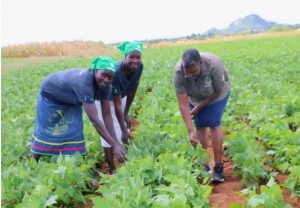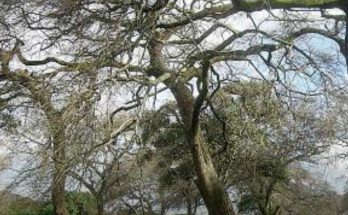
By Estella Toperesu
SOUTHERN Alliance for indigenous resources (SAFIRE), in partnership with Oxfam, University of Zimbabwe (UZ), the Swedish Meteorological Hydrological Services (SMHI) and in collaboration with a number of Government partners, implemented a Swedish International Development Co-operation (SIDA) funded grant titled ‘Climate Adaptation for Rural Livelihoods (CARL)’ which aims to improve the socio-economic well-being of Zimbabwe’s rural population by reducing poverty and food insecurity in the face of climate change.
In Buhera district the project has supported resuscitation of Mutunha communal irrigation scheme in Ward 15, a key enabler meant to enhance food and income security for smallholder farmers. The initiative is meant to propel the community towards food self-sufficiency through guaranteed year round crop production.
Buhera is one of the districts which are equally exposed to the devastating vagaries of climate variability and change. The district is especially vulnerable because the livelihoods of the majority of the population depend on rain-fed agriculture.
The increasing frequency of climate extremes continue to amplify existing risks in natural dry land system including water scarcity and droughts that have become major climate change related challenges facing rural communities in the central and southern parts of Buhera district.
Even though the scheme was a vital investment for climate resilience in the district, it has not been functioning for 14 years, stretching from 2005 to 2018, hence the farmers had to resort to dry land cropping in the irrigation scheme.
The project supported installation of a solar powered irrigation system now functional and currently 18,5 hectares is under irrigation and owned by a total of 37 Farmers. Apart from improving food security, the farmers now have access to reliable and affordable smart energy for irrigation which is a key factor in enhancing sustainable livelihoods in the face of climate change.
Before the project interventions, the farmers had resorted to dryland cropping, selling wild fruit, trading, donor food assistance, village savings and non-environmentally friendly activities that included stream bank cultivation.
Majority of women were involved in gardening activities but it was not sustainable due the crippling water shortages during the dry season. Gender based violence caused by financial challenges was becoming a norm in the district.
The revival of Mutunha irrigation scheme facilitates economic transactions and improves livelihoods, wealth and infrastructure for the community. The scheme is now one of the examples of an energy smart irrigation system which is playing a pivotal role in the reduction of food insecurity, malnutrition and poverty as well as contributing towards economic empowerment of the local people.
With access to irrigation, Mutunha rural community farmers have been able to increase their agricultural production and productivity maximising on cropping cycles within the same agricultural year. This increase in agricultural production translates into greater food availability at both local and national level.
Likewise, increased food production translates into higher income for farmers.
This is achieved through sales and home-consumption and generating greater food access among rural households. The farmers have managed to produce 35 tons of sugar beans, 45,6 tons of maize, 18,5 tons of wheat over 3 seasons. A total of US$45,200 has been raised form selling beans.
Income realised is being used for acquiring productive assets, improvement of homesteads, paying of fees as well as paying security guards who are providing security services for the solar field and the irrigation scheme.
Speaking during a site visit to the scheme recently, one of the beneficiaries, Mrs Beauty Mutunha expressed gratitude towards the project as it sought to ensure that communal farmers become food self-sufficient.
“We want to thank the project because we are now able to produce our own food even in the dry season despite the area being dry and hot. Our main problem before this scheme was revitalised was food insecurity, we used to rely more on food assistance from donors like World Vision, World Food Programme, and social welfare among others.
“The revival of this scheme has empowered us as women. For a long time I had a desire to build an asbestos roofed kitchen but I didn’t have money, however, since the coming of this irrigation scheme I started working until I raised enough money from my produce to build my kitchen and now I am happy that I managed to fulfil my dream as a woman,” she said.
“With this CARL project, as smallholder farmers here in Mutunha irrigation scheme, we are now growing high value crops, both for local and outside markets, thus effectively contributing towards the sustainable development goal of reducing hunger and poverty.
“Since the project has done its part in resuscitating this irrigation scheme, as farmers we should be responsible by maintaining the water infrastructure and employing good agricultural practices. Even in drier periods, dryland farmers will no longer rely on food handouts from donors,” added Mrs Mutunha.
Chairperson of Mutunha irrigation scheme, Mr Joab Mutunha said the resuscitation of the irrigation schemes would go a long way in ensuring that communities do not depend on non-governmental organisations for food aid.
“We are now producing our own food and since stopped relying on donations. If people are to get donations here in ward 15, it has to be in the form of infrastructure and other developments since it is a long term benefit, not food aid,” he said.
Mr Mutunha added that his community was self-sufficient last season (April-August) as they harvested their irrigated wheat and agreed that each farmer would contribute 11 bags of wheat earmarked for exchange with fertilizer at the Grain Marketing Board (GMB) since inputs like fertilizers are expensive.
SAFIRE Team leader of Agriculture and Livelihoods Mrs Estella Toperesu said that the project has contributed significantly to resilience building of household and community resilience to the effects of climate change in Mutunha village in Buhera South.
“……..Both plot holders and the community at large now have increased access to food (cereals, legumes and vegetables) and income.
Sustainability measures facilitated by the project that include organisational and technical skills enhancement, input and output market linkages, effective collaboration mechanisms with relevant government departments and establishment of a maintenance facility will go a long way in ensuring sustainability of the irrigation scheme beyond project life.
“However, there is need for combined effort by community and relevant government authorities to address issues exacerbating land degradation upstream, notably stream bank cultivation that is contributing to siltation of Mutunha dam,” she said.
In light of such developments, it has to noted that modernisation in agriculture did not just entail sophistication of the infrastructure being used, but the simplicity and clarity of the management tools aswell.
Empowering communities with innovative technologies such as solar powered irrigation schemes like Mutunha is in line with National Development Strategy 1 towards vision 2030.
As such, one can note that the rehabilitation of rural irrigation schemes promotes food security and improves the standard of living of the rural people and this further shows a multifaceted role of irrigation schemes in contributing towards food security.
As Government steps up efforts to resuscitate viable smallholder irrigation infrastructure, it is an important acknowledgement that irrigation is sustaining and guaranteeing the country food security in the face of drought.
Pursuant to this project SAFIRE, with support from other donor agency is doing a lot more of climate adaptation programs in other districts around the country, initiatives which ensure holistic ideas of climate proofing agriculture, especially in the communal areas, becomes a reality.
This resonates well with the National Development Strategy which seeks to put 350 000 hectares under irrigation countrywide using idle water bodies and dams under construction.



